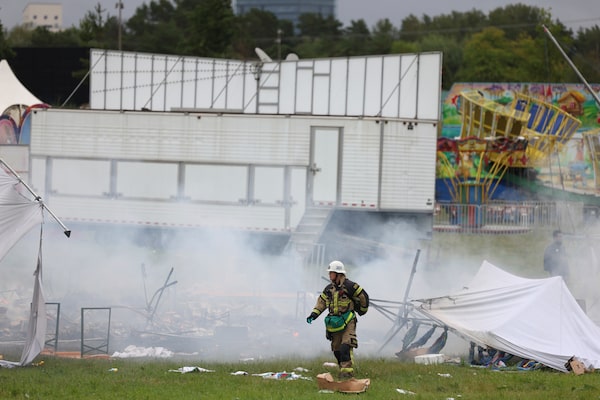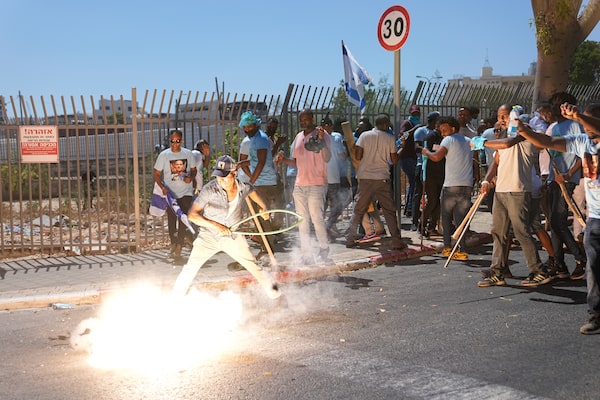Members of Toronto's Eritrean community rally outside City Hall on Nov. 29, 2023, demanding protection for cultural festivals like the ones this past summer that were disrupted by protesters.Christopher Katsarov/The Globe and Mail
On a freezing morning in Toronto this winter, dozens of Eritrean Canadians gathered on a plaza in front of City Hall, waving Eritrean flags as they braved the sub-zero temperatures in a bid to save their annual festival.
Passersby might have been puzzled by their pleas for constitutional freedoms and police protection. But it was the latest chapter in a global struggle between rival Eritrean factions – and another sign of how diaspora groups in Canada and elsewhere are becoming the new battleground for the tensions in their home countries.
For decades, Eritrea’s authoritarian regime has reaped cash and political support from cultural festivals in cities around the world. But in a recent switch in tactics, opposition groups have begun targeting those gatherings and seeking to disrupt them.
The protests and counterprotests have often escalated into violence, culminating in police intervention, arrests, injuries and sometimes the shutdown of the festivals.
Clashes have surged rapidly in the past year, with conflicts breaking out at Eritrean events in Germany, Sweden, Switzerland, Israel, Australia, Britain and the United States.

A firefighter walks through smoke at the 'Eritrea Scandinavia' festival in Stockholm this past August, where some booths were set on fire.Magnus Lejhall/TT News Agency via AP
The latest bloodshed was on Saturday, when 14 people were injured by bricks and stones hurled in clashes at an Eritrean festival in Melbourne, Australia.
Two weeks earlier, in London, four police officers were injured and eight people arrested after pro-democracy Eritreans protested outside another Eritrean event.
Festivals in Toronto, Edmonton and Calgary were among the many Eritrean events where violence broke out last year, injuring dozens of people. In some cities, including Toronto, the festival permits were revoked. Now the organizers are worried that another wave of clashes this summer could trigger the loss of their permits again.
“I never thought this would ever happen,” said Goay Ogbaslase, a 57-year-old Eritrean-Canadian woman who witnessed the violence at the Toronto festival last summer.
She says she has lived in Toronto for 36 years and never felt fear until now. “It’s something that has changed me,” she told The Globe and Mail. “People I don’t know came and attacked me. Since the festival, it’s like I have a nightmare.”
Toronto police keep watch on the Nov. 29 protest as demonstrators hold the red, blue, green and yellow flag of Eritrea.Christopher Katsarov/The Globe and Mail
Eritrea is one of the world’s most repressive countries, often called the North Korea of Africa. Elections are banned. Independent media and political parties are not allowed. Poverty is widespread, and citizens are conscripted into military service for indefinite periods that can stretch into decades.
The only way for opponents to voice their opinions and put pressure on the regime is in the diaspora. After decades of refugees and migrants leaving the country, the Eritrean diaspora – as a percentage of its population – is one of the largest in the world.
A new opposition group, Brigade N’Hamedu, formed in 2022 and decided to be more assertive in disrupting the festivals and other government-linked events. Its members, wearing blue shirts, descend on the festivals to harass them.
Pro-regime activists, meanwhile, are fighting back. A loyalist group, called Eri Blood or The Fourth Front, has mobilized to defend the festivals with violence if necessary. In Canada, and elsewhere in the world, the two sides ended up battling with wooden sticks, flagpoles, metal rods, rocks and stones.
“It’s the new front line,” said Kjetil Tronvoll, a Norwegian professor of peace and conflict studies who specializes in Eritrea and Ethiopia.
“As the diaspora youth have organized better to confront the regime at these festivals and meetings, the regime itself is also fighting back in the diaspora,” he said. “The violence is not only from the opponents, but also because the regime’s supporters in the diaspora are being trained and instructed to hit back with violence against these protests. I think these conflicts will escalate in the future.”
Toronto police confront protesters outside a Sheraton Hotel on Aug. 6, 2023, after the city revoked the Eritrean festival's permit for the long weekend.Arlyn McAdorey/The Canadian Press
At least 32 people were injured in the clashes last summer in Toronto, Edmonton and Calgary. About 150 people were involved in the fight in Calgary, where Police Chief Mark Neufeld called it “a planned, targeted attack” and the “largest violent event to happen in our city in recent memory.”
The festivals have been a source of resentment for many Eritrean emigrants for years. “The regime has hijacked Eritrean cultural events, festivals and national ceremonies to promote war propaganda, spread hate speech, radicalize youth, polarize Eritrean communities and fund its conflicts,” said Mahdere Seyoum Berhe, director of advocacy at an Eritrean human-rights group in Manitoba.
His group is among a large number of Canadian diaspora and human-rights groups that have been granted standing at Canada’s public inquiry into foreign interference in elections and democratic institutions.
Eritrean Canadians often face intimidation, surveillance and threats of reprisals at these government-linked events, Mr. Berhe said. If they are deemed to be disloyal in their political views, the regime can punish their families in Eritrea by confiscating their property or businesses, jailing them, denying services to them or even prohibiting their relatives from being sent to their homeland for burial, he said. “It’s like you run away from the regime and the regime is right here in Canada re-traumatizing you,” Mr. Berhe said. “That’s basically how the government in Eritrea is controlling the diaspora everywhere in the world. … Canadian officials are not doing enough to block the foreign interference.”
It has become a global issue. A report to the Norwegian government last October, by the research group Proba, said the Eritrean government has threatened families in Norway with punishment if their relatives abroad are involved in any opposition activities. Pro-regime people in the Eritrean community have put pressure on émigrés to ostracize those who support the opposition, the report said.
“Threats of various kinds are used, and the community is described as characterized by a culture of fear and as being under the strong influence of the Eritrean authorities,” it said.

A stun grenade from Israeli police explodes next to Eritrean protesters in Tel Aviv on Sept. 2, 2023.Ohad Zwigenberg/The Associated Press
With the rise of social media and increasing migration, many countries have seen their internal conflicts go global. During the Tigray war in northern Ethiopia, tensions in the Ethiopian diaspora led to fierce lobbying campaigns by all sides, including efforts to shut down speakers on university campuses. Social media were flooded with death threats, intimidation and organized trolling campaigns.
But the Eritrean diaspora is perhaps the most violently divided. The stakes are high. The Eritrean regime raises funds at the festivals by selling flags, T-shirts and other merchandise, Mr. Berhe said. Sometimes its fundraising is more blatant: Eritrean émigrés and refugees in many countries are told to pay a 2-per-cent tax to the embassy or to the government itself. If they refuse to pay, they can face arrest when they visit Eritrea, a United Nations report found.
In 2013, Canada ordered a senior Eritrean diplomat to leave the country after the Eritrean consulate in Toronto ignored a federal order to stop collecting the 2-per-cent tax. But the “diaspora tax” continued. Instead of collecting the tax in Canada, Eritrean diplomats told the émigrés that they must pay the tax to the Eritrean government. Similar demands are reportedly made at many of the Eritrean festivals worldwide.
While Eritrea has an official population of about four million, as many as 700,000 people have left the country since the government began cracking down on the opposition around 2001. Many are young and increasingly frustrated by the lack of any political reforms inside Eritrea and the relatively passive stand of older diaspora groups. Now they are willing to risk arrest by the police in cities such as Toronto and Calgary.
“The diaspora saw that, in order to get attention to their plight, their grievances, they need to get into the media – that’s how Western democracy works – and then the politicians will address it,” Prof. Tronvoll said.
“So this is a deliberate strategy. To get attention from the media, you start to make a nuisance, you stand your ground, you start to fight, to make trouble.”
Targeting the festivals and government-sponsored meetings abroad is a shrewd choice, he said. “You hit the funding capacity of the regime. These festivals are used to socialize the diaspora and their children into the regime’s ideology of extreme nationalism and self-reliance. By preventing these festivals and meetings from taking place, you break the regime’s ability to gain support in the long run.”
The clashes in the diaspora are also a “training ground” for the opposition, emboldening their supporters and potentially inspiring resistance to the regime inside their homeland, Prof. Tronvoll said.
“For these totalitarian regimes, the most important factor for their survival is the reproduction of fear among the population. Earlier generations didn’t dare, but now they’re bold enough, courageous enough, to oppose the regime. If that courage is brought back home, the regime is dead, and they know it. That’s why they’re fighting back so intensely to regain control of the diaspora.”